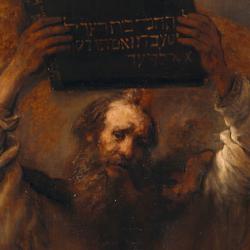Samson Raphael Hirsch’s Horeb is worth reading on any topic – stimulating, eccentric, illuminating, infuriating. His treatment of the eighth commandment brings out several key themes.
First, he defines property as “an artificial extension of the body” (227), and since the body is a “tool” for the spirit, so property is a further embodiment of the human spirit. Crimes against property aren’t, therefore, simply crimes against property but sins “against the invisible human spirit” and “against God, Who demands of you respect for the human spirit and its property” (227).
In keeping with this, second, he describes the acquisition of property as an incorporation into one’s personality. This can happen by literal physical seizure of something as one’s own, or “by bringing it within the orbit and the sphere of influence of his artificially extended personality, such as his house, courtyard, etc.” However acquired, the property belongs to the personality of the owner, and that ownership must be respected by everyone (233). We can see in this a reflection of God’s own “taking up” of things into His extended personality – the consecration of holy vessels that are used in His house, for example.
This is the ground, he argues, for the responsibility that an owner has for his property: “Man, in taking possession of the unreasoning world, becomes guardian of unreasoning property and is responsible for the forces inherent in it, just as he is responsible for the forces of his own body; for property is nothing but the artificially extended body, and body and property together are the realm and sphere of action and of the soul – i.e., of the human personality, which rules them and becomes effective through them and in them. Thus is the person responsible for all the material things under his dominion and in his use” (243).
For Hirsch, third, word is essential to economic life, to ownership. Force rules in nature, but among men law must be sovereign, and language is “the principal means of establishing [legal] ownership” (235). Economic as much as social transactions depend on reliable words: “Do you not see that human society is founded on the word and on the confidence in and respect of the word; that the purest expression of man is his word, that with this word he completes his earthly task and that to discard reliance on the word is to discard one’s very humanity” (236).
Finally, each individual – and so, his property – should be a blessing to others. Hirsch says that not every Jew is a hasid, who renounces private ownership to devote himself and his property to others. But all should at least oversee property so that it doesn’t bring harm to a neighbor (248). Hirsch doesn’t expound further on the point, but he implies that our property exists not only to serve our own needs and wants, but also to bless others.
It’s from these premises that Hirsch delves into the duties of honesty in buying and selling, the obligations of renters and those who provide safe-keeping for another’s property, weights and measure (about which he says, strikingly, that a seller should “let the buyer control the correctness of your measuring,” 242).
The assumption Hirsch develops are essential to any biblical understanding of economic life. Economic activity isn’t detachable from the persons doing the activity; economic exchanges are dimensions of inter-personal exchanges; they are inter-personal exchanges through the medium of things, money, services.
On the other hand, “personal” relations are sometimes treated as if they could be carried out without such media, as if every inter-personal relation were as intimate, as body-to-body, as a sexual counter.
Neglecting Hirsch’s common sense is fatal both to an understanding of economics, and to an understanding of inter-personal relations.











